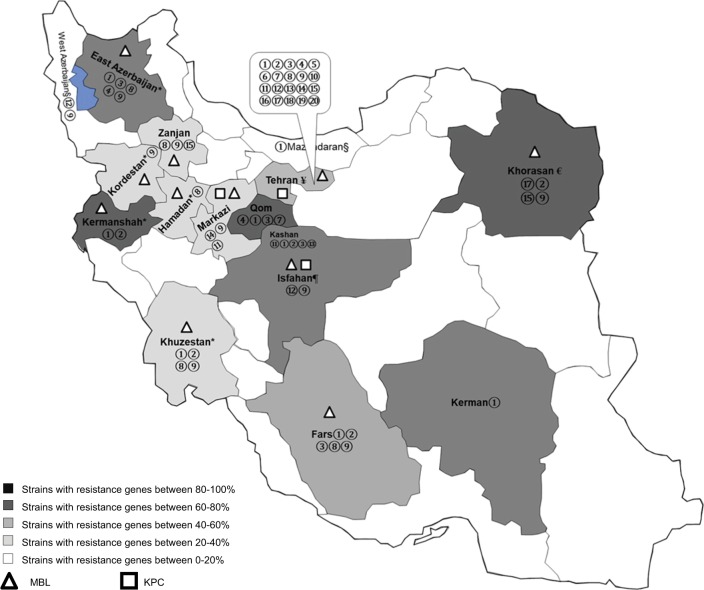Figure 4.
Carbapenem-resistant rates in different areas of Iran (according to the phenotypic and genotypic methods).
Notes: The data were extracted from the latest available studies. Multicenter studies from different cities were not considered for mapping due to pooled data. The studies in the special populations (ie, pediatrics or cystic fibrosis) and outpatients were excluded.
Some genes like blaSPM and blaSHV are mostly known as genes that encode ESBL enzymes, but they were included in this map, because these genes were assessed along with carbapenemase genes, and also overexpression of these genes concomitant with harboring efflux pump may be responsible for resistance to carbapenems. *Data for these five provinces were extracted from 2011 to 2014 articles, so new data are needed.
€Data were extracted from a 2015 study with 36 samples; another study in 2013 confirmed the presence of the genes of resistance in 4% of strains. ¥Data from Tehran province were conflicting; genes encoding resistance were detected in 15%–50% of isolates through 2015–2016. ¶Data from Kashan (a city in Isfahan province) showed presence of resistance genes in 80% of isolates in 2015.
§In Mazandaran and West Azerbaijan, these genes were reported, but rates of resistance were not included because the studies included different cities from different provinces. ① blaOXA-23 ② blaOXA-24 ③ blaOXA-58 ④ blaOXA-40 ⑤ blaOXA-48 ⑥ blaOXA-10 ⑦ blaOXA-143 ⑧ blaIMP ⑨ blaVIM ⑩ blaSPM ⑪ blaGES ⑫ blaPER ⑬ blaNDM ⑭ blaKPC ⑮ blaTEM ⑯ blaSHV ⑰ blaADC ⑱ blaSIM ⑲ blaGIM.
Abbreviations: ESBL, extended spectrum β-lactamase; KPC, Klebsiella-producing carbapenemase; MBL, metallo-β-lactamase.

